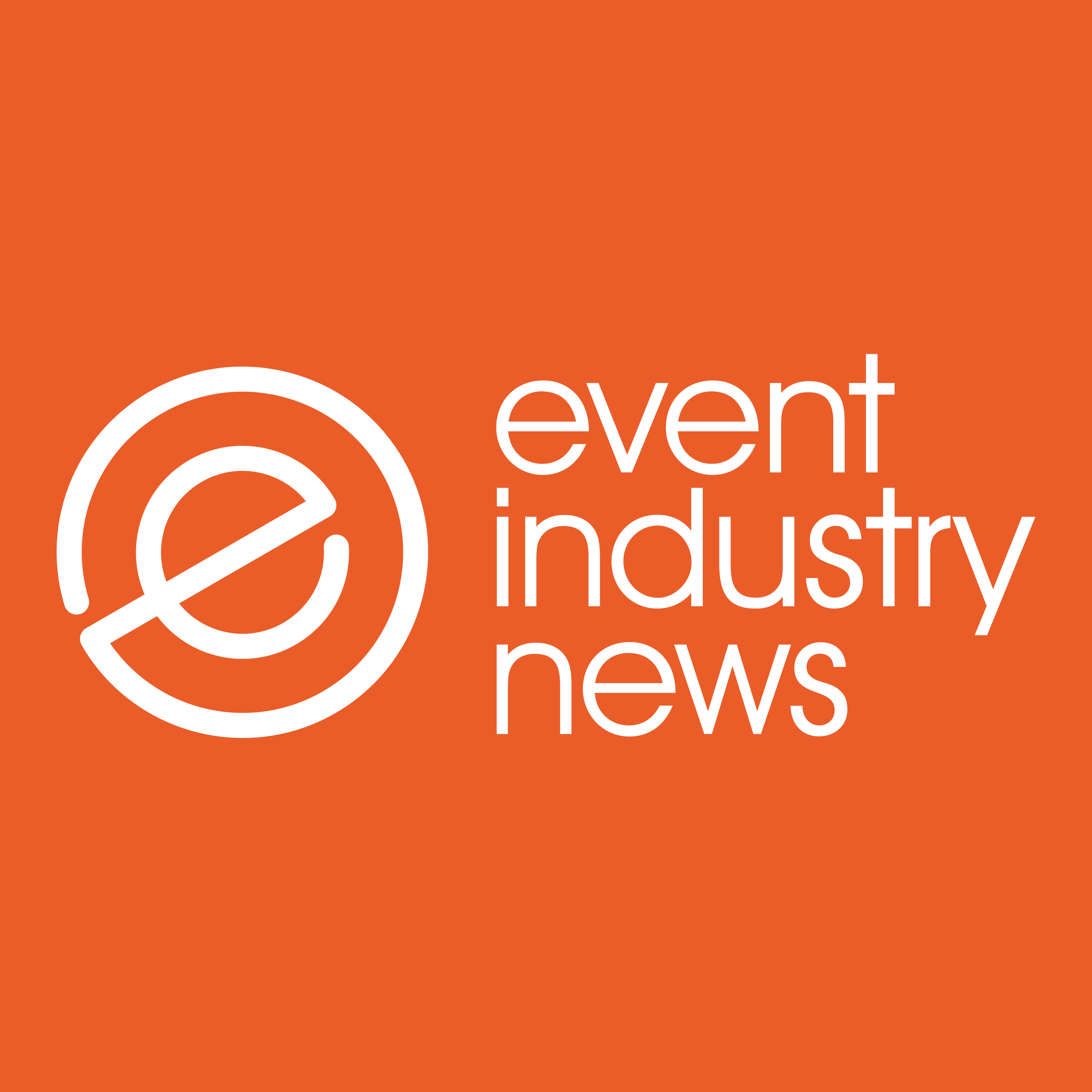Episodes

Thursday Jul 16, 2020
From organisation to event tech
Thursday Jul 16, 2020
Thursday Jul 16, 2020
Founder and CEO at Washington-based Hubb, the virtual/hybrid/physical event platform, Allie Maygar launched her first company, Impulse Productions, age 21. Stepping across to event technology five years ago, that sprit of ingenuity, entrepreneurism, burns just as fiercely.
In this episode Allie discusses how the event industry Stateside, and Hubb in particular, has changed, or adapted, under the COVID-19 shadow, new partnerships, what the rest of 2020 looks like and more besides.
We also talk about Allie’s virtual conference, Untethered, ‘created by and for the event industry’ early in lockdown with all proceeds, some $17,500 and counting, going to the Meeting Industry Fund.
To keep up to date with all the news, subscribe for free here.
If you would like to take part in a podcast, then please complete our submission form.

Thursday Jul 09, 2020
A tech provider’s take on virtual & hybrid events in 2020
Thursday Jul 09, 2020
Thursday Jul 09, 2020
This week’s episode features Kevin Lorch, managing director at Eventscase, a white label software business focused on providing the perfect integrated platform for conference organisers, speakers, sponsors and attendees.
In enterprise and SaaS sales for 20 years, Lorch discusses the new tech behind virtual events, the elements he thinks will endure on the other side of the coronavirus window and the ones that won’t.
We also look at COVID-19’s impact on particular types of event and where, when and how the corporate/conference sector will find its feet again, in terms of situation and revenue, through the new normal and beyond.
To keep up to date with all the news, subscribe for free here.
If you would like to take part in a podcast, then please complete our submission form.

Thursday Jul 02, 2020
The significance of Human interaction
Thursday Jul 02, 2020
Thursday Jul 02, 2020
This week’s episode welcomes James Tucker, COO at GovNet, a well-established UK event supplier that delivers public sector conferences, expos and training courses, from local government and housing to the NHS and higher education sector.
A self-proclaimed “tech geek”, James joined the family-run business around 18 months ago to oversee the day-to-day operations.
This edition of the Event Industry News Podcast explores the significance of human interaction and networking, engagement metrics of virtual events compared to live events, and the importance of post-event customer engagement.
Also, we talked about the impact of new technologies across the sector and using data to make strategic and informed business decisions.
To keep up to date with all the news, subscribe for free here.
If you would like to take part in a podcast, then please complete our submission form.

Thursday Jun 25, 2020
The Importance of Human Connection with Matt Culverhouse, TEN6 Creative
Thursday Jun 25, 2020
Thursday Jun 25, 2020
The two elements that Matt identifies as a “worry” are the exhibition environment and networking as they are difficult to replicate online.
Matt’s background working for some of Europe’s largest venues coupled with his creative arts education gives him a unique understanding of live event management - from both the agency and hospitality perspectives.
Matt oversees live events of all sizes and levels of complexity, including managing production, creative and logistics for shows as large as 85,000 attendees. An expert in project management and negotiating contracts, Matt has worked all over the world, always delivering a commitment to personal service to surpass the expectations of clients and attendees.
To keep up to date with all the news, subscribe for free here.
If you would like to take part in a podcast, then please complete our submission form.

Thursday Jun 18, 2020
Montgomery Events - sponsored by Grip
Thursday Jun 18, 2020
Thursday Jun 18, 2020
This episode is sponsored by Grip, a leading AI-powered event matchmaking solution for virtual and hybrid events.
Montgomery Events, a subset of the Montgomery Group, focus mainly on food, drink and hospitality events as well as several different niche events in the UK and Netherlands.
My guest this week is managing director, Lori Hoinkes, who started with the company three 3 years ago with an early project being to harmonise data by streamlining suppliers using a good CRM system, and subsequently, building two tech systems for internal use:
Bento: This system was built to help the company better categorise exhibitors, sponsors and visitors. They recently used this to create six key-personas of visitors to identify which type would be more valuable to exhibitors. This process resulted in a 33% increase in attendance.
Sherlock: This system was built to facilitate a ‘health check’ of an event analysing, social listening, survey data and lead generation.
The analysis and targeted process has made the team more productive and has increased revenues. The data aids the decision as to which new events to launch, an area of the company’s growth strategy.
To keep up to date with all the news, subscribe for free here.
If you would like to take part in a podcast, then please complete our submission form.

Thursday Jun 11, 2020
Special Edition with industry guru, Katie Morhen
Thursday Jun 11, 2020
Thursday Jun 11, 2020
Starting her event career in 2007 with Reed Exhibitions, my guest this week, Katie Morhen, has helped some of the largest exhibition organisations drive attendance and increase sales.
Founder of 52eight3, a specialist marketing agency, the company recently announced the launch of a new free-to-attend training event aimed to support marketers and connect the wider exhibition community.
The need for effective liaison between sales and marketing teams is more important than ever. In time gone by, sales teams would be prioritised to receive training ahead of marketing personnel; organisations may need to consider levelling the support across the whole team if they want the best chance of “getting their audiences back”
To keep up to date with all the news, subscribe for free here.
If you would like to take part in a podcast, then please complete our submission form.

Tuesday Jun 09, 2020
Podcast: The Launch of SaaStock Remote
Tuesday Jun 09, 2020
Tuesday Jun 09, 2020
This week’s very special guest is Saastock founder Alex Theuma. Following a career in IT, Telecoms and Cloud, Alex moved on to creating a powerful network across the Saas founder and investor community.
During the recording, Alex talks about the pivot to virtual and the launch of SaaStock Remote which open its virtual doors tomorrow (10th June 2020). And, shares his opinion about the future of events and how he’s leveraging technology to serve his global community.
This episode will no doubt be of interest to event organisers around the globe.
To keep up to date with all the news, subscribe for free here.
If you would like to take part in a podcast, then please complete our submission form.

Tuesday Jun 09, 2020
Podcast: The Launch of SaaStock Remote
Tuesday Jun 09, 2020
Tuesday Jun 09, 2020
This week’s very special guest is Saastock founder Alex Theuma. Following a career in IT, Telecoms and Cloud, Alex moved on to creating a powerful network across the Saas founder and investor community.
During the recording, Alex talks about the pivot to virtual and the launch of SaaStock Remote which open its virtual doors tomorrow (10th June 2020). And, shares his opinion about the future of events and how he’s leveraging technology to serve his global community.
This episode will no doubt be of interest to event organisers around the globe.
To keep up to date with all the news, subscribe for free here.
If you would like to take part in a podcast, then please complete our submission form.

Thursday Jun 04, 2020
Pioneering Digital and Online Events
Thursday Jun 04, 2020
Thursday Jun 04, 2020
Joining the podcast this week is William Thomson, author, event consultant and head honcho at Gallus Events.
The digital and online event world is new territory to many event professionals, but William started his digital event journey more than a decade ago.
In this episode, he offers insight into monetising events, how to make sure the content for attendees is on point and how to produce long-term evergreen content that can generate recurring revenue, post-event.
Further delving into the digital event world, we also touch on a new online course; a learning framework for members of the industry looking to organise online events.
To keep up to date with all the news, subscribe for free here.
If you would like to take part in a podcast, then please complete our submission form.

Thursday May 28, 2020
Social Media Tips and Tricks from digital producer at George P. Johnson
Thursday May 28, 2020
Thursday May 28, 2020
Joining me this week is Caitlin Kobrak, digital producer at George P. Johnson.
Managing social media campaigns for mega-events such as Cisco Live, we discuss her favourite social media tools and tactics.
Platforms that were once thought to be relevant only to teenage audiences, Caitlin explains how this landscape has changed over the last two years, and, how businesses can use consumer-focused platforms like TikTok to feed a B2B event campaign on other business-oriented platforms.
Lots to learn from this edition including, how to measure social post success, how to best focus your efforts and how social media for events could look in the future.
To keep up to date with all the news, subscribe for free here.
If you would like to take part in a podcast, then please complete our submission form.

